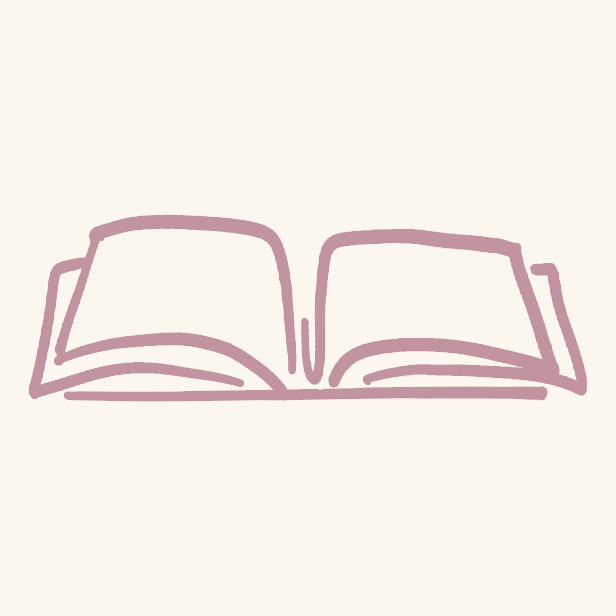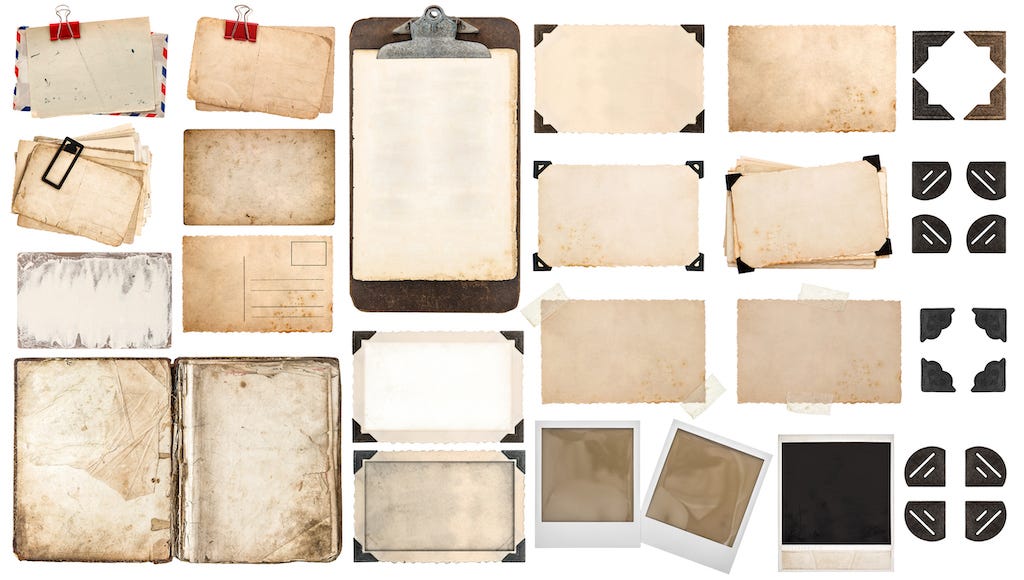Prompt 214. The Journal Dilemma
Some thoughts & a prompt on what to do with it
Hi friend,
I’ve thought about the question of privacy and journals for a long time. Over the years, I’ve asked other people what they plan to do with theirs, and I developed half-formed notions about what I’d do with mine. Recently, I received a Dear Susu question from a grieving mother—not long ago, she stumbled upon some journals belonging to her daughter, who died of an accidental drug overdose fifteen years ago. Her letter was devastatingly beautiful, full of love and grief and confusion. “Can I destroy her writing?” she asked, “To protect her, and perhaps myself. She wrote brutally honestly.”
Writing through the answer was illuminating, helping me shape my own half-formed notions into full ones. Maybe even more so was what happened in the comments section, where our community weighed in with their own experiences. One person wrote, “As a prolific journaler myself, I wrestle with this all the time—what would I want my husband and/or kids to do with my many volumes?”
And then came so many voices, grappling with the complexities of what a journal is, what its afterlife should be, and where our control over it ends. I’ll give you a sampling:
“As I was packing to move back into my childhood home, I found my old journals. In reading through them, I was confronted with the fact that there were many entries that I didn’t want anyone reading after I died. Without giving it too much thought, I burned them. At the time, it was a huge relief, but now looking back, I wish I had taken time to curate them and keep more passages that were meaningful to me.”
“Our daughter died from cancer at 24. I went through all her things page by page and found many treasures along the way. I can see some of her past text messages that I’m sure were never meant for my eyes… I also have lots of personal journals and I’ve told my husband that if I die first, he should burn them. Nothing good would come of them and they would hurt people. I want the freedom to write what I want but it’s a processing tool—not a way to hurt others. If he decides not to do that—well, at least he was warned :)”
“After my mom died I opened one of her journals, and in a few pages knew they weren’t meant for reading… So I burned them, and then realizing my kids would also have a decision to make about my journals one day, I burned them too. It was such a release of the pain worked through in these journals that it really freed me. Now I journal daily thanks to your 100-day commitment in April, which I’ve continued. These journals aren’t all angst, I think I’ll keep them.”
“I often worry that when I die, if my daughter finds my diaries… and discovers my darkest days and my fleeting thoughts, how that will land. These words of wisdom… are a gift and a prompt for me to have a conversation with my daughter.”
These nuanced responses were so inspired that I decided to adapt part of this Dear Susu column into an essay and prompt. You’ll find it below. May it help you untangle the dilemma of the journal and begin to make a plan for what will become of yours.
Sending love,
Suleika
Some Items of Note—
Today from 1-2 pm ET is our next meeting of the Hatch, our virtual creative hour for paid subscribers. Carmen and Holly will be hosting and talking about hope as a creative impulse. For the link to join—or to upgrade to a paid subscription if you haven’t yet—just click here!
In the Isolation Journals Chat, our new community space, we’re continuing our weekly ritual: a collective gratitude list of small joys. The Chat feature is currently in beta testing and available only on iOS-operated mobile devices, but it should be available for Android and the web very soon! You can find more info and join the conversation here!
Prompt 214. The Dilemma of the Journal by Suleika Jaouad
I got my first journal when I was in the third grade—as a gift from my mother. My family was moving to Tunisia for a year, and my mom gave one to me and another to my brother so we could record our adventures in our father’s homeland. It was a lovely object: a little leather-bound notebook with a rawhide string to wrap around it and keep the contents safe.
I don’t recall what I wrote in there, but it was the start of what I consider the most important practice of my life. During my adolescent years, my journal was a place for self-discovery and experimentation. I wrote fiction and poetry. I made lists of things I wanted to accomplish some day—some realistic, sometimes less so. (An item from one such list: Cut arm and leg and eye holes in my double bass case to make it into a suit.) There were entries that were “aspirational” (i.e., straight up lies), and more than a couple of stories inspired by Isabelle Eberhardt, the Swiss woman who traveled across North Africa disguised as a young Arab man, then penned stories about colonial officers in seedy brothels.
I took my journal everywhere I went, which wasn’t a problem until one afternoon in middle school. When I went into my ballet class, I left my bag with my journal in it in the changing room, and an older girl I really admired but also feared pulled out my journal and devoured its contents. She then proceeded to tell everyone what she’d read—something about a boy I liked and also a sordid Isabelle Eberhardt-inspired tale about a promiscuous young woman. (I wish I could say that was the last time my Isabelle Eberhardt fan fiction has been the cause of humiliation. More on that another day!) I felt so violated. What I had written was never intended for anyone’s eyes, and certainly not this mean girl’s.
Journaling is a private, vulnerable experience. I’ve come to think of the journal as a sacred container, where you show up as your most unedited self. Each journal entry is a glimpse of what you think and feel at a given time on a given day, and we often we admit things we wouldn’t say out loud. It doesn’t mean we’re filling pages with rants about our loved ones, though that’s what my dad thinks. Whenever he sees me scribbling away in a journal, he jokes, “There you go again—complaining about your poor papa!” I say, “Dad, don’t flatter yourself. It hardly ever occurs for me to write about you.”
I’ve spoken at length about the journal as a private, selective, even curated space with my mom, who is a prolific journaler. She told me she imagines me reading her journals in the years to come, and she likes the idea—she thinks of it as a way for me to feel close to her and to understand her more deeply. “But often I’m writing about hard things, or I’m writing in anger or some other intense emotion,” she said. “So what’s written in my journal should not be read as definitive fact.” This resonated deeply: so often the journal calls to me when I’m struggling. When I’m happy, I have fewer knots to untangle.
So the journal is a record of the unedited self at selective moments, when the ego is swaying between conscious and unconscious impulses—testing reality, you could say. And if that’s the case, it makes sense that people ask so often, “What should I do with my journals?”
Like the journal itself, the question of what to do with them is deeply personal—and well worth contemplating. At one end of the spectrum, there are people who write theirs with an imagined audience. At the other are those who are terrified that their journals will be stumbled upon, who go to great lengths to conceal them. Some secret them away in a safety deposit box. Others have thrown them into a fire, taking comfort in the sight of the pages being curled by flame, disintegrating into ash.
Several years ago, I locked mine in a trunk, and I lost the key. Now even I can’t read them—even if I want to, even if revisiting those old experiences might help me now. Anyone got a box cutter?
Your prompt for the week:
Make a plan for the afterlife of your journals. Do you want to destroy them? Curate them? Preserve them in full—for family, for friends, for strangers to read?
Then consider the loved ones who might be affected by your choice. Ask yourself what you’d want them to know about your journals, how you’d like them treated, and why.
If you’d like, you can post your response in the comments section, in our Facebook group, or on Instagram by tagging @theisolationjournals.
For more paid subscriber benefits, see—
Carrying Complicated Grief, an installment of Dear Susu I answer a question from a conflicted but loving mother: “Can I destroy my daughter’s journals?”
On Secrets, a video replay of our Studio Visit with the brilliant Dani Shapiro, where she talked about shame’s role in secret-keeping (hint: it’s at the root), writing about the past, and her trove of journals and commonplace books
25 Things About Me, where our community divulged everything (well, at least 25 things!), from the most trivial facts to the deepest secrets











I think there are two types of journaling (possibly being conflated by our readers). One is more akin to the Artist Way or Morning Papers where we write anything and everything to extract, develop or clear our mind of creative debris. Then the second is called expressive journaling which is meant to unearth the subconscious, free repressed rage and relieve pain by teaching ourselves to feel our emotions. For the latter, there are studies showing that ripping up expressive journaling is actually more productive for healing because it creates a separation to your thoughts, a barrier to rumination, a very Zen outcome. So, at the risk of sounding pedantic, I think it makes sense to have two different kinds of journals and make individual decisions for their journeys.
I’ve started and stopped countless journals over the years and have gone back through some old ones to jog my memory about certain details of my daughter’s early days with illness, for my memoir-in-progress. It was painful to jump back into the rawness of my unfiltered younger self.
I still love journaling as a way to untangle, as Suleika put it. I’ve tried Liz Gilbert’s technique of writing a conversation between Fear and Love and it’s been enormously cathartic.
As for what to do with my old journals, I will probably slip many into our shredding box for our yearly purge of files that get destroyed on a truck in our driveway. But I will keep writing new ones. I may include a note in the front of any I keep warning that these entries were often me at my most troubled and not a complete picture.
I came across a packet of love letters my mom wrote my dad in the beginning of their relationship and halfway into one realized they were R rated and not something I’d be able to unsee. More importantly I knew they were never intended for eyes other than his (he’s been gone 11 years. She is in memory care). I am destroying the packet, unread by me. My siblings don’t know about them. It’s my gift to my mom.